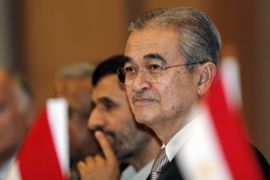Developing nations ‘to act on food’
Leaders of ‘D8’ make commitment to increase food production to combat hunger.

Price rises
Abdullah, the new D8 chairman, said global food prices were estimated to have risen by more than 75 per cent since 2000.
He said D8 nations should modernise their agriculture sectors to take advantage of “good and fertile land.”
“With food and oil prices going high, the only alternative is agriculture and we agreed to diversify our economies and divert to agriculture,” Yousuf Raza Gilani, Pakistan’s prime mnister, said.
Abdullah said that the threat of a global recession has implications for stability in developing nations.
“The price of oil has skyrocketed to levels never anticipated … the price of food has increased beyond the normal abilities to pay by the poor, which form the majority of the world’s people,” he said.
“There is also the danger of the food crisis creating political unrest in many societies.”
He urged other nations to act to reduce record prices of crude oil, while calling on industrialised nations to act to ease the plight of those less well-off.
“The most important thing that we would like to see is whether decisions made there not only affect rich countries, but also poor countries affected by the oil hikes,” he said.
“I don’t think it is an exaggeration if I say that the whole world is waiting to hear what this conference has decided.”
Wary of biofuels
Mahmoud Ahmadinejad, Iran’s president, blamed Western nations for the sharp rise in oil prices.
“This situation of oil crisis is an artificial situation. Today we see production is more than the consumption of the market and we see the market is full of crude oil,” he said.
 |
| Rising food prices have led to hunger and protests in developing nations [AFP] |
Susilo Bambang Yudhoyono, Indonesia’s president, said it is imperative that access to food and energy is secured.
“There is no quick-fix that will sweep aside this challenge. But we must act on it at once and in concert. To delay concerted action on this great challenge of our time is to court disaster,” he said.
Abdullah said that developing nations had to be wary of using agricultural land to grow crops for the production of biofuels.
He said such a move would worsen the global food shortage and drive up food prices.
“We must not allow the zeal for energy security to come into direct conflict with the basic need for food production,” he said.
Also on Tuesday, campaigners at a conference in Mali urged G8 leaders to honour their pledges on aid to Africa.
“Gentlemen of the G8, respect your commitments,” Bernard Ouedraogo, a campaigner from Burkina Faso, said at the conference near Bamako.
“I do not want to go into the figures, but remember the development aid announced – where is it? It was just talk, just talk,” he said.
The G8 promised at a summit in 2005 to boost aid to Africa by $25bn by 2010, but so far the industrialised nations have only increased development assistance to Africa by $3bn, Oxfam says.
Those gathered at the summit in Mali said that the G8 countries had failed Africa.
“They are meeting Monday to talk about Africa, but we don’t expect anything from these meetings. They cannot do anything and they will not do anything for this continent,” Nouhoun Keita, an anti-poverty campaigner, said.